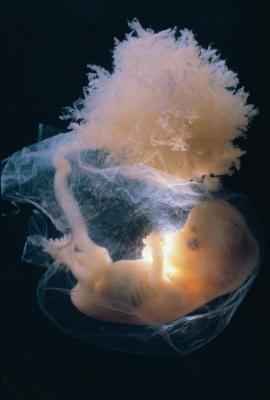From the time of conception to the time of birth, your baby goes through some intricate, complex developmental stages. Most healthy pregnancies last about 40 weeks and encompass three separate periods known as trimesters. Each trimester lasts between 12 and 14 weeks. The embryo stage of development occurs during the first trimester of pregnancy.
Early Development
The first trimester of your pregnancy begins with the first day of your last menstrual period, although conception doesn’t occur for approximately two more weeks. Before your baby becomes an embryo, he goes through the initial stages of development, known as the zygote stage and the blastocyst stage.
Embryo Stage
The embryonic stage of your baby’s development begins at five weeks. At the start of the embryonic period, the collection of cells that make up your baby consists of three layers. These layers include the ectoderm, the mesoderm and the endoderm, all of which work together to form your baby’s future systems, including his skin, nervous system, circulatory system, lungs, intestines and other organs. The placenta also develops during the embryonic period. The embryonic stage lasts until week 10 of your pregnancy, at which point your baby becomes a fetus.
Size
At the beginning of the embryonic stage, your baby likely measures between 1.5 to 3 mm, or 1/16 to 1/8 of an inch long. This is about equal to the size of the tip of a pen. At 10 weeks development — the time that marks the completion of the embryonic stage — your baby measures approximately 1 inch in length. At this early stage of development, he is still too small for you to feel his movements.
Developing Systems
One of the first systems to develop is your baby’s nervous system. This includes his brain, spinal cord and nerves. An S-shaped tube that forms early in the embryonic stage marks the beginning of your baby’s heart, which begins pumping blood by the sixth week of pregnancy. His face, arms, legs and sexual organs also begin forming during this stage. His muscles and nerves cause him to twitch, although purposeful movements won’t start until his nerves and muscles begin working together.
Precautions
Because such major development occurs during the embryonic stage, this is a critical period when your baby is most susceptible to developmental damage. The University of Maryland Medical Center warns that certain substances, such as some recreational and prescription drugs, as well as alcohol, may lead to birth defects. Other potential hazards include nutritional deficiencies, X-rays or radiation therapy and infections, like rubella or cytomegalovirus.





